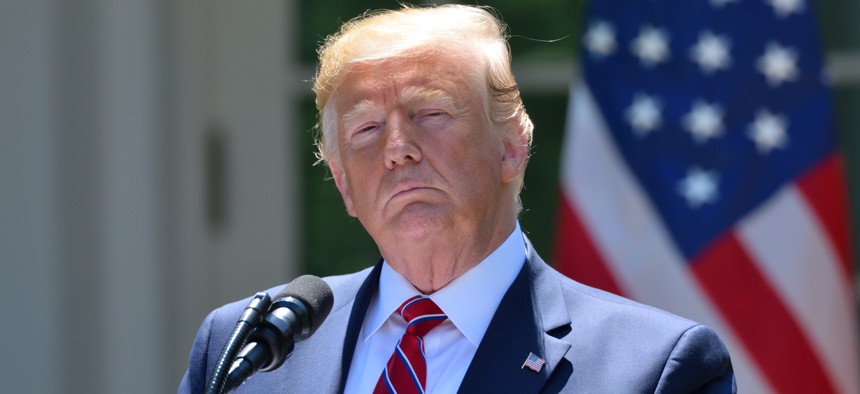OMB Advises Agencies on Contractors’ Limiting Their Use of Foreign Workers

Evan El-Amin/Shutterstock
The agency issued a memo to supplement President Trump’s executive order in August.
The White House issued guidance to all federal agencies last week about how they should be reviewing their procurement practices to ensure that only U.S. citizens and nationals are working on federal contracts, as President Trump mandated in an August executive order.
The executive order was aimed at protecting Americans’ jobs as the country faces an economic recession due to the novel coronavirus pandemic. It reflected the federal government’s increased reliance on contractors and emphasized the need to protect national security.
The order required the heads of agencies and departments to review the contracts they awarded in fiscal 2018 and fiscal 2019 to determine if contractors and/or subcontractors used temporary foreign labor and to what extent, specifically asking them to look for “any potential effects on national security” and/or “negative impact” of hiring temporary foreign labor or offshoring of labor on the economy. They must submit a report to the Office of Management and Budget in December with their findings and potential proposed reforms to comply with the executive order.
“To enable a timely understanding of this impact, which may require agencies to conduct outreach with their contractors, agencies should prioritize reviewing the practices of contractors on which they rely the most,” wrote OMB Deputy Director Derek Kan in the memo, dated November 19. “Accordingly, agencies should evaluate, at a minimum, service contracts from the 25 contractors with which they have made the most obligations during [fiscal years] ‘18 and ‘19, or such number of contractors to cover at least 10% of the agency's obligations for services during this period, whichever is less, for work performed in the United States.”
The memo outlines specific metrics agencies should look into regarding their contractors’ use of temporary foreign labor, offshore activities and hiring practices that will be included in their reports that are due on December 31. The reports also must include recommendations for improving federal procurement.
“For example, an agency might make recommendations that could be considered by the Federal Acquisition Regulatory Council regarding standard provisions that require, support, or incentivize contractors' disclosure of information on their employment of foreign nationals, to the extent appropriate and permitted by applicable law,” Kan wrote. As “an additional example, recommendations could be made for consideration by the departments of Labor or Homeland Security for possible improvements to relevant information systems managed by those departments that could be leveraged by agencies in performing the types of analyses required by the executive order in the future.”
Less than a month after the reports are due, President-elect Joe Biden will be sworn into office, and could rescind any executive orders from Trump. It is unclear if this will be one of them.
The executive order also said that agency heads will work with the Office of Personnel Management to review their employment policies to ensure they are in compliance with the 1976 executive order that says only U.S. citizens and nationals may be hired for federal employment and a corresponding section of the fiscal 2020 appropriations bill. The only mention of that in the memo is: “Agencies have flexibility in how such reviews are conducted.”
The final aspect of the directive (not mentioned in the memo) was that by September 17, the Labor and Homeland Security departments had to take action to “protect United States workers from any adverse effects on wages and working conditions” from contractors employing holders of H-1B visas, which are for temporary foreign workers in specialty occupations. It was not clear how many contractors or employees could be affected.
Neither department responded to Government Executive about an update on this by the time of the article’s publication.
When the president first issued the executive order, contracting experts questioned how agencies would carry it out and its merits, as Forbes reported. There is still some trepidation.
“This is the kind of data collection that creates unnecessary and unhelpful barriers to entry, drives up transaction costs, and makes our profession unattractive to skilled business professionals,” Steve Schooner, procurement law professor at The George Washington University and former Office of Federal Procurement Policy official, told Government Executive on Monday. “It contributes nothing to the outcomes that actually matter in public procurement - getting agency program managers and end users the goods and services they need to achieve agency missions, ensuring that the government receives value for the money it pays, etc.”
NEXT STORY: Quick Hits






